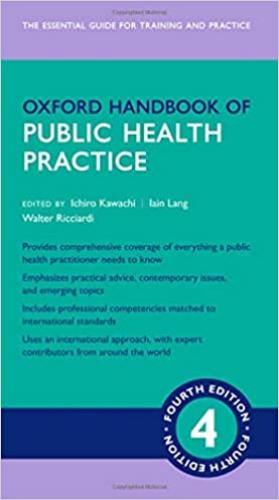Oxford Handbook Of Public Health Practice
| Item Information | |
|---|---|
| Item#: | 9780198800125 |
| Edition | 04 |
| Author | Kawachi, et al.. |
Fully revised and updated for the fourth edition, the award-winning Oxford Handbook of Public Health Practice remains the first resort for practitioners in the field. Structured into practical sections addressed towards professional competencies and translating evidence into policy, this
Handbook provides concise summaries and covers real issues from across the globe, providing a world of experience at your fingertips.
Easy-to-use, concise, and practical, this Handbook is divided into seven parts that focus on the vital areas of this broad discipline. Reflecting recent advances, the most promising developments in the practice of public health are presented, along with essential summaries of the core disciplines.
Specific sections are devoted to the development of professional competencies including negotiation, communicating risk to the public, community action, and translating evidence into policy.
Written by an international team of experts, and considering both social and scientific advances since the previous edition, this Handbook will assist students, trainees and practitioners around the world with its enriched information on the management of disasters, epidemics, health behaviour,
acute and chronic disease prevention, community and government action, environmental heath, vulnerable populations, and more.
Table of Contents
1. Assessment
1.1. Gabriele Bammer: Scoping public health problems
1.2. Sian M. Griffiths, Robyn Martin, and Don Sinclair: Priorities and ethics in health care
1.3. Julian Flowers: Assessing health status
1.4. John Wright and Ben Cave: Assessing health needs
1.5. Alex Scott-Samuel, Kate Ardern, and Martin Birley: Assessing health impacts
1.6. Peter Brambleby: Economic assessment
2. Data and information
2.1. Barry Tennison and Lamberto Manzoli: Understanding data, information, and knowledge
2.2. Don Detmer: Information technology and informatics
2.3. Sara Mallinson, Jennie Popay, and Gareth Williams: Questions, design, and analysis in qualitative research
2.4. Walter Ricciardi and Stefania Boccia: Epidemiological approach and design
2.5. Kalyanaraman Kumaran and Iain Lang: Statistical understanding
2.6. Iain Lang: Inference, causality, and interpretation
2.7. Anne Brice, Amanda Burls, and Alison Hill: Finding and appraising evidence
2.8. Richard Hopkins and Aaron Kite-Powell: Monitoring disease and risk factors: surveillance
2.9. Patrick Saunders, Andrew Kibble, Amanda Burls, and A.T Saunders: Investigating alleged clusters
2.10. Rachael Brok, Sara Stevens, and Jem Rashbass: Assessing longer-term health trends: disease registers
3. Direct action
3.1. Sarah OBrien: Communicable disease epidemics
3.2. Wendy Heiger-Bernays and Kathryn Crawford: Environmental health risks and assessment
3.3. Stefanos N. Kales and Michael S. Chin: Safeguarding and promoting health in the workplace
3.4. Meredith Minkler and Charlotte Chang: Engaging communities in participatory research and action
3.5. Paul Bolton and Frederick M. Burkle, Jr: Disasters
3.6. Angela Raffle, Alex Barratt, and J. A. Muir Gray: Assuring screening programmes
3.7. Hilary Burton and Mark Kroese: Genomics
3.8. Rachel Faulkenberry, Mesfin Bekalu, and Kasisomayajula Viswanath: Health communication
3.9. Steve Gillam: Public health practice in primary care
3.10. Shoba Ramanadhan: Translating research into practice - implementation science
4. Policy arenas
4.1. Don Nutbeam: Developing healthy public policy
4.2. Lauren Smith and Ichiro Kawachi: Translating evidence to policy
4.3. John Battersby: Translating policy into indicators and targets
4.4. Rebekah A. Jenkin, Christine M. Jorm, and Michael S. Frommer: Translating goals, indicators, and targets into public health action
4.5. Simon Chapman and Becky Freeman: Media advocacy for policy influence
4.6. Tim Lang and Martin Caraher: Influencing international policy
4.7. Nicholas Banatvala and Eric Heymann: Public health in poorer countries
4.8. Lawrence Gostin: Regulation
4.9. David Pencheon, Sonia Roschnik, and Paul Cosford: Health, sustainability, and climate change
5. Healthcare systems
5.1. Elena Azzolini, Mary Harney, and Walter Ricciardi: Sustainability of healthcare systems
5.2. David Lawrence: Planning health services
5.3. Martin McKee and Ellen Nolte: Comparing healthcare systems
5.4. Richard Richards: Commissioning healthcare
5.5. Thomas Rice: Controlling expenditures
5.6. Corrado De Vito and Paolo Villari: Using guidance and frameworks
5.7. Diana Delnoij: Health care process and patient experience
5.8. Chiara de Waure and Carlo Favaretti: Health technology assessment
5.9. Sharon Friel: Improving equity
5.10. Nick Steel, John Ford, and Iain Lang: Improving quality
5.11. Martin McKee, Marina Karanikolos, and Ellen Nolte: Evaluating health care systems
5.12. Muir Gray and Walter Ricciardi: Value-based healthcare
6. Personal effectiveness
6.1. Fiona Sim: Developing leadership skills
6.2. Edmund Jessop: Effective meetings
6.3. Edmund Jessop: Effective writing
6.4. Alan Maryon-Davis: Working with the media
6.5. John Ford, Nick Steel, and Charles Guest: Communicating risk
6.6. Charles Guest: Consultancy in a national strategy
6.7. Leonard Marcus: Effective negotiation
7. Organizations
7.1. Virginia Pearson: Governance and accountability
7.2. John Fien: Programme planning and project management
7.3. Mike Gogarty: Business planning
7.4. Shannon L. Sibbald, Anita Kothari, Malcolm Steinberg, and Beverley Bryant: Working in teams in public health
7.5. Julian Elston: Partnerships
7.6. Jeanette Ward and Jeremy Grimshaw: Getting research into practice
7.7. Felix Greaves and Charles Guest: Workforce

